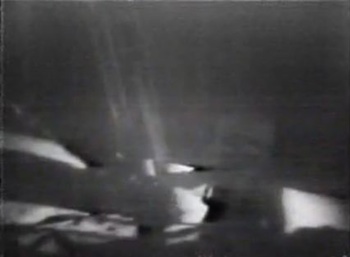[This post is part of the series 50 to 50, started last year to mark my 50th birthday. One post per year, y’see. The series ground to a halt due to a combination of work and personal pressures, as well as finding that such intense reminiscences of my own past were emotionally draining. The series has now been resumed.]
The 1960s were the Space Age. And since I was a bright male child of that decade, my thoughts were dominated by the events, images and themes of space exploration.
It doesn’t look much now, but this photo was the very pinnacle of all that. Or perhaps the apogee. Neil Armstrong stepping onto the surface of the Moon. One small step etc, taken from the original TV footage.
I was mesmerised — even though half the time my nine-year-old self couldn’t figure out what was going on. I’d been following the story as it unfolded in the newspapers, reading every word and memorising every diagram. It was front page news every day. But the TV images were just crap.
Of course the reason they were crap was the circuitous journey they took from the Apollo mission’s slow-scan TV cameras. The signal was compressed from arsehole to breakfast time and bounced from the Moon to the Parkes Radiothermal Telescope in rural New South Wales, then somehow to NASA Mission Control in Houston where the audio was mixed in, then back to Australia to the TV stations, and finally out through the normal broadcast chain.
It’s a miracle they arrived at all, as the film The Dish portrayed — along with its historical inaccuracies.
But historians and popular culture tell us that the world stopped to watch these blurry images, and we all remember where we were. And it’s true.
Scheduled to happen in prime TV viewing hours in the US, that first step was broadcast early afternoon Australian time. We got a day off school to watch it. Myponga Primary School only had one television, wheeled on its trolley from classroom to classroom as required. That wasn’t going to work for the whole school.
So my family watched the moonwalk at the home our of friends the Lorenzetti family. They had a better TV, ‘cos they were richer than us. I remember sitting on the carpeted floor in front of a TV in a wooden cabinet. I remember being frustrated because it was all supposed to be so important to watch, and I wanted it to be exciting, but it started off as a high-contrast blur and everything happened so slowly.
The Apollo 11 mission was, as I say, the apogee of the Space Age. But space — or should I say Space, capitalised — dominated my childhood in so many other ways.
I kinda knew I has a “strong interest” in space, but the recent comment by schoolmate Michael Mignanelli really hit me.
One thing that amazed [us] was the fascination you had for space ships. On the bus and at school, you were always drawing space ships, they were drawn very neat and also to scale, for some one your age at the time, it was amazing. We were convinced that later in life you would probably finish up in America working on some space mission.
He’s right. I was fascinated. Perhaps even obsessed? What do you make of all this?
- I could identify by sight all of the manned space vehicles, US and Soviet. I could talk you through their mission profiles. I could explain escape towers and transfer orbits and ablative heat shielding. And much more. By the time I was eight years old. Well, not the mathematics of the transfer orbits.
- I named the farm’s cats after spacecraft. My favourite cats were named after Soviet space vehicles because they simply looked so much cooler. I seem to recall that I got to name the cats because my mother hates the critters and my father couldn’t give a shit.
- An old film projection booth on wheels became my imaginary spacecraft, as explained previously.
- An antique steam locomotive in the Victor Harbor playground was also re-imagined as a spacecraft, much to the annoyance of the other kids playing there. Until I realised that the “control room” was in the middle rather than at the front, so it obviously worked better as a submarine. Those other kids were all just stupid and unimaginative. And I told them so.
Back when I was a kid, Space was exciting. Today it’s just a routine place you stash satellites and, as I’ve written before, somehow NASA has made it boring.


Don’t forget the full-colour cards you could get in Weetbix boxes to stick into the free special book you sent away for, the snap-together rockets in the Kellogg’s boxes, the thing in the News or Advertiser which you cut out and pasted into the free special book you got from them….like you, we were sent home from school and told to come back at lunchtime. Nothing had happened by then, so we were sent home again, where I fidgeted in front of the TV waiting for something to happen that look vaguely Ster Trek or Lost In Space-ish – and like yourself was somewhat disappointed by dark blurs.
@B Smith: I certainly do remember the Kellogg’s cereal packet premiums, to use the industry term of the time. And I’ve just written a supplementary post about the Kellogg’s Molab. Enjoy.